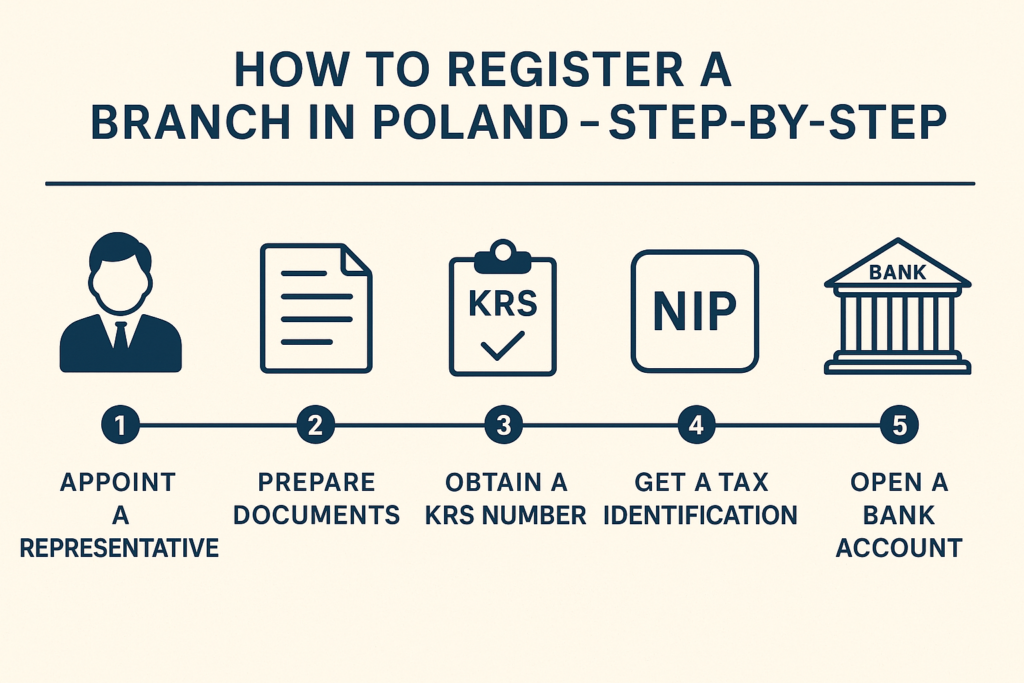Foreign companies looking to expand their business in Poland often consider establishing a branch office or a representative office. This article focuses on the taxation of a branch in Poland, outlining key obligations, tax rates, and registration requirements under Polish tax law.
What Is a Branch in Poland?
A branch in Poland is a legally dependent unit of a foreign company, established to carry out business activities on the territory of Poland. While a branch office is not a separate legal entity, it must maintain its own accounting records and comply with Polish regulations. The branch acts on behalf of the parent company and conducts commercial operations in Poland.
Branch or Representative Office?
Before opening, a foreign company must decide whether to establish a branch or a representative office in Poland. A branch may carry out all types of business activities, while a representative office is limited to promotional and marketing activities only.
Key difference: A branch is subject to Polish corporate income tax (CIT), whereas a representative office generally is not, due to its limited function.
Subsidiary vs Branch vs Representative Office in Poland
What’s the Difference for a Foreign Company?
Foreign companies looking to expand their business in Poland can choose from three main legal forms:
a Polish subsidiary, a branch, or a representative office. Each has different legal, tax, and operational implications. Below we explain the key differences to help you make an informed decision.
1. Polish Subsidiary (Spółka córka)
A subsidiary is a separate legal entity registered under Polish commercial law – usually as a limited liability company (Sp. z o.o.) or joint-stock company (S.A.).
Key characteristics:
- Has its own legal personality
- Owns property and signs contracts independently
- Subject to full CIT (corporate income tax) in Poland on worldwide income
- Can perform any business activity allowed by Polish law
- Requires more formalities and capital to set up
- Treated as a Polish company
Best for: Long-term investment and full operational presence in Poland.
2. Branch of a Foreign Company (Oddział)
A branch is an extension of the foreign parent company, not a separate legal entity.
Key characteristics:
- Legally part of the parent company
- Can only perform activities within the scope of the parent company’s business
- Subject to CIT in Poland on income earned in Poland
- Must keep separate accounting records in Poland
- Less formal to establish than a subsidiary
- Requires registration with the KRS and Polish NIP
Best for: Companies wanting operational presence without forming a new company.
3. Representative Office (Przedstawicielstwo)
A representative office is limited to non-commercial activities, such as marketing and promotion.
Key characteristics:
- Cannot conduct business or generate income
- Not subject to corporate income tax
- Meant for exploring the market or brand promotion
- Registered for a maximum of 2 years (with option to renew)
- Must be listed in the Register of Representative Offices maintained by the Ministry of Development
Best for: Early-stage market presence, research, or brand awareness without tax or legal risks.
Which Option Should You Choose?
| Goal | Recommended Form |
| Full operational business | ✅ Subsidiary |
| Operate under parent company | ✅ Branch |
| Test the market or promote brand | ✅ Representative Office |
Subsidiary vs Branch vs Representative Office (Poland)
| Feature | Subsidiary | Branch | Representative Office |
|---|---|---|---|
| Legal Form | Independent entity | Part of foreign company | No legal personality |
| Business Activities | Unlimited (any lawful) | Same as parent company | Promotional only |
| Corporate Income Tax (CIT) | Yes – full worldwide | Yes – Polish income | No |
| Registration | Polish commercial register (KRS) | KRS + NIP | Ministry of Development |
| Accounting | Own full accounting | Separate records in PL | Minimal |
| Independence | Full operational control | Limited | None |
| Use of Profits | Reinvest/distribute locally | Parent company | Not applicable |
How to Register a Branch in Poland
To register a branch in Poland, a foreign company must:
- Submit the appropriate application to the Polish National Court Register (KRS)
- Appoint a representative in Poland
- Provide translations of company documents
- Obtain a Polish tax identification number (NIP)
- Register for VAT and other tax obligations (if applicable)
The branch requires a registered office in Poland and must comply with local accounting and tax regulations.
Taxation of a Branch in Poland
Subject to Corporate Income Tax (CIT)
A branch of a foreign company in Poland is treated as a Polish tax resident for tax purposes and is subject to corporate income tax (CIT) on the income earned in Poland.
- Standard CIT rate: 19%
- Reduced CIT rate: 9% (for small taxpayers or new companies with income under €2M/year)
- Minimum income tax: Applies if the branch shows low profitability over consecutive three tax years
The income of legal persons earned by the branch in Poland is taxable in Poland, even though the company is headquartered abroad.
CIT Rate Comparison (Poland)
| Type of Taxpayer | CIT Rate | Notes |
|---|---|---|
| Standard taxpayers | 19% | Applies to most companies and branches |
| Small taxpayers (revenue ≤ €2M/year) | 9% | Applies to newly established or small businesses |
| Entities subject to minimum income tax | 10% (approx.) | Applies to low-profit businesses (profitability ≤2%) |
| Capital groups / Tax capital groups | 19% | Specific rules apply to consolidated corporate groups |
| Representative office | 0% | Not subject to CIT unless conducting business activities |
Note: A foreign company’s branch is subject to Polish CIT only on income generated in Poland.
Taxable Income of a Branch
The taxable income of a Polish branch includes income earned in Poland from all business operations. Costs directly related to those activities may be deducted.
Branches of foreign companies must:
- Submit annual corporate income tax returns
- Make income tax payments to the local Polish tax office
- Maintain separate accounting records in accordance with Polish regulations
- Submit financial statement
Double Taxation and Tax Treaties
Poland has signed numerous double tax treaties that prevent double taxation of income earned by a foreign company in Poland. These treaties typically allow taxation in Poland, with the home country of the parent company providing tax relief.
Example: If a branch pays CIT in Poland, that amount may be credited or exempted from tax in the company’s home country, depending on the treaty.
Minimum Income Tax in Poland
As of recent changes in the Polish tax system, companies including branches with low profitability (e.g., 2% or less of revenue) may be subject to the minimum income tax. This tax applies regardless of whether the branch shows a profit, based on certain financial indicators.
Summary: Key Points About Taxation of a Branch in Poland
| Aspect | Details |
| Legal Form | Not a separate entity – part of the foreign company |
| Tax Identification | Polish NIP required |
| Tax Obligation | Subject to Polish CIT on Polish-sourced income |
| Tax Rates | 19% standard, 9% reduced, minimum income tax possible |
| Accounting | Separate accounting in line with Polish law |
| Representative | Required for registration and ongoing compliance |
| Double Tax Relief | Available through treaties |
Should You Open a Branch in Poland?
Opening a branch in Poland allows a foreign company to directly operate in the Polish market. However, this comes with full tax and accounting obligations. If the goal is only to explore the market or build brand presence, a representative office may be more suitable.
Each case should be evaluated individually, considering the scope of planned business activity in Poland, expected income, and tax implications.
How to Register a Branch in Poland – Step-by-Step
| Step | Description |
| 1. Prepare documentation | Collect founding documents, company statutes, proof of legal existence (with translation) |
| 2. Appoint a representative | Assign a person authorized to act in Poland on behalf of the foreign company |
| 3. Apply to National Court Register (KRS) | File an application for branch registration with translated documents |
| 4. Obtain a tax identification number (NIP) | Register the branch at the local Polish tax office |
| 5. Register for VAT (if applicable) | Required if the branch engages in taxable activities in Poland |
| 6. Set up accounting system | Maintain books of account in Polish and in compliance with Polish standards |
| 7. Open a bank account | For operational and tax purposes |
| 8. Comply with ongoing tax and reporting | File CIT returns, pay income tax, and fulfill annual obligations |
Important: All documents must be translated into Polish by a sworn translator.

Need Help with Registration or Taxation in Poland?
At INTERTAX, we support foreign companies in the full process of establishing and registering a branch in Poland, handling compliance, reporting, and communication with the Polish tax office.
Contact us to ensure your Polish branch is registered and taxed efficiently under the current Polish legal and tax system.

